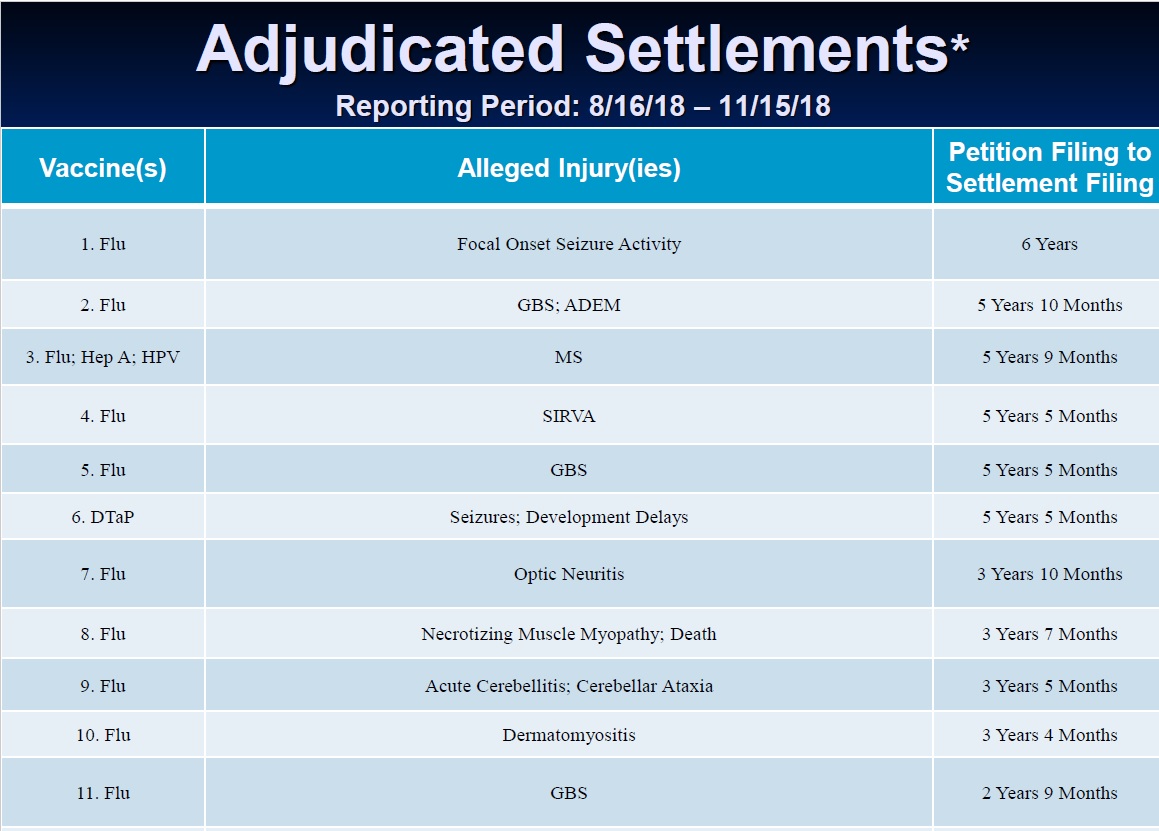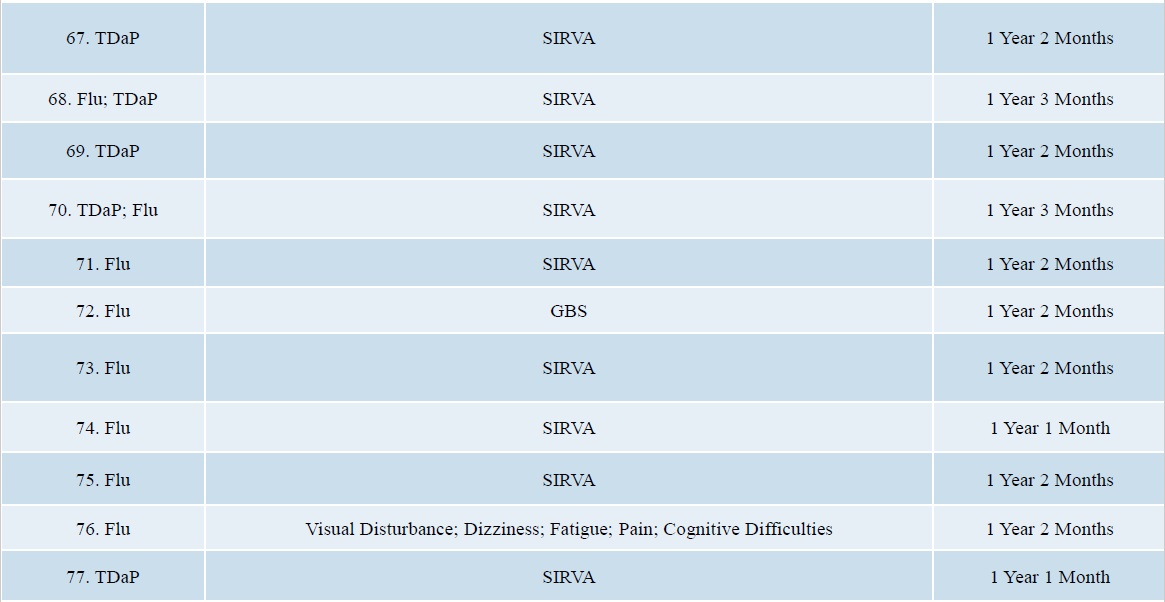U.S. Government Pays Out Millions to Flu Shot Victims Killed or Paralyzed

Flu season is in full swing, and once again reports are coming in that formerly healthy people are suffering serious harm or even dying from taking the flu shot.
The fact that the annual flu shot is deadly and dangerous is not a fact even in dispute.
by Brian Shilhavy, Health Impact News Editor
But these facts are seldom, if ever, communicated to the American public before marketing the flu shot to the entire population, including those most vulnerable such as young babies and sick seniors, as the flu shot is marketed in retail pharmacy stores across the nation as if they are just as safe as buying a candy bar or pack of gum.
As you will see below, the Department of Justice report on compensated cases for vaccine injuries and deaths in the U.S. Vaccine Court, submitted each three months to the federal government Advisory Commission on Childhood Vaccines (ACCV) under the U.S. Department of Health and Human Services, shows that millions of dollars are being spent for injuries and deaths due to the flu shot.
As far as I know, Health Impact News is the only news source publishing this government data on compensated cases due to vaccine injuries and deaths.
The December 6, 2018 meeting just concluded, and government attorney Catharine Reeves reported that there were 144 settlements for vaccine injuries and deaths the past 3 months, and 89 of those cases were listed in her report (see below). Some of these cases took more than 5 years to settle.
Of those 89 cases compensated, 77 were for injuries and one death caused by the flu shot, making the flu shot the most dangerous vaccine in the United States, by far.
The side effects of the flu shot include (among others):
GBS – Guillain–Barré syndrome is a rapid-onset muscle weakness caused by the immune system damaging the peripheral nervous system. The initial symptoms are typically changes in sensation or pain along with muscle weakness (paralysis), beginning in the feet and hands. This often spreads to the arms and upper body, with both sides being involved.
TM – Transverse myelitis is an inflammation of both sides of one section of the spinal cord. This neurological disorder often damages the insulating material covering nerve cell fibers (myelin).Transverse myelitis interrupts the messages that the spinal cord nerves send throughout the body.
ADEM – Acute disseminated encephalomyelitis, or acute demyelinating encephalomyelitis, is a rare autoimmune disease marked by a sudden, widespread attack of inflammation in the brain and spinal cord.
CIDP – Chronic inflammatory demyelinating polyneuropathy is a neurological disorder — a condition that targets your body’s nerves. Symptoms aren’t the same for everyone, but you may be tired and have areas of numbness and pain.
MS – Multiple sclerosis is a demyelinating disease in which the insulating covers of nerve cells in the brain and spinal cord are damaged. This damage disrupts the ability of parts of the nervous system to communicate, resulting in a range of signs and symptoms, including physical, mental, and sometimes psychiatric problems.
SIRVA – SIRVA stands for “Shoulder Injury Related to Vaccine Administration.” It can happen when a vaccine is injected into the shoulder too high or too deep and can cause several types of injuries. SIRVA can lead to intense, prolonged pain, limited range of motion, and shoulder-related injuries such as Adhesive Capsulitis or Frozen Shoulder Syndrome.
Myasthenia gravis is a long-term neuromuscular disease that leads to varying degrees of skeletal muscle weakness. The most commonly affected muscles are those of the eyes, face, and swallowing. It can result in double vision, drooping eyelids, trouble talking, and trouble walking.
Peripheral Neuropathy is damage to or disease affecting nerves, which may impair sensation, movement, gland or organ function, or other aspects of health, depending on the type of nerve affected.
DEATH – people die after receiving the flu shot.









Read the full report in the ACCV meeting book.
Vaccine Injuries are Seldom Reported
In November of 2014, the Government Accounting Office (GAO) issued the first report on America’s “Vaccine Court,” known as the National Vaccine Injury Compensation Program (NVICP), in almost 15 years.
Congress gave the pharmaceutical companies immunity against lawsuits for injuries or deaths resulting in vaccines in 1986. Prior to this time, there were so many lawsuits pending against pharmaceutical companies for injuries and deaths due to vaccines, that the pharmaceutical industry basically blackmailed congress and told them that if they did not grant them legal immunity against the liabilities of vaccines, that they would quit making them. These vaccine products cannot survive in a free market, they are so bad.
The November 2014 GAO report criticized the government for not making the public more aware that the National Vaccine Injury Compensation Program exists, and that there are funds available for vaccine injuries. Therefore, the settlements represented by vaccine injuries and deaths included in the DOJ report probably represent a small fraction of the actual vaccine injuries and deaths occurring in America today.
The U.S. government keeps a database of reports documenting vaccine injuries and deaths called The Vaccine Adverse Event Reporting System (VAERS). The problem is that very few medical officials ever report vaccine injuries or deaths, either because they are not trained to recognize them, or due to pressure within their profession to not report them. To admit that vaccines do cause harm is professional suicide for most doctors and medical professionals.
Hence, the quarterly DOJ report on vaccine cases only represents a tiny fraction of the actual cases that exist.
Why Many Flu Shots in the U.S. May Be Illegal
After the NVICP was passed into law in 1986, the administration of vaccines must follow federal guidelines, and it is possible that the annual flu shot given to the masses each year so easily via retail outlets like drug stores, may not even be legal.
Information About the Flu Vaccine that is Required by Federal Law
You Must Receive a Vaccine Information Statement Prior to Receiving a Flu Shot
When someone injects you with the flu vaccine (as well as most other vaccines), federal law requires that they first give to you a Vaccine Information Statement (VIS) before injecting you.
Federal law (under the National Childhood Vaccine Injury Act) requires a health care provider to give a copy of the current VIS to an adult patient or to a child’s parent/legal representative before vaccinating an adult or child with a dose of the following vaccines: diphtheria, tetanus, pertussis, measles, mumps, rubella, polio, hepatitis A, hepatitis B, Haemophilus influenzae type b (Hib), influenza, pneumococcal conjugate, meningococcal, rotavirus, human papillomavirus (HPV), or varicella (chickenpox). Source.
In addition to the requirement to give you this VIS about the vaccine you are receiving (and if it is a multi-dose vaccine they are required to provide a VIS for each dose), whomever is administering the vaccine is also required by federal law to:
record in the patient’s medical record (or permanent office log or file) the following information:
- The edition date of the VIS (found on the back) (i.e., the date of the visit, right bottom corner)
- The date the VIS is provided (i.e., the date of the visit when the vaccine is administered)
In addition, providers must record:
- The office address and name and title of the person who administers the vaccine
- The date the vaccine is administered
- The vaccine manufacturer and lot number
What are the Warnings About the Flu Shot Given in the VIS?
There are currently two Vaccine Information Statements related to the flu vaccine, one for flu vaccines that are “Live, Intranasal” and one for all flu vaccines that are “Inactivated or Recombinant.”
Here is what these Statements say about who should not receive flu vaccines:
Inactivated or Recombinant flu shot:
Tell the person who is giving you the vaccine:
• If you have any severe, life-threatening allergies. If you ever had a life-threatening allergic reaction
after a dose of flu vaccine, or have a severe allergy to any part of this vaccine, you may be advised not to
get vaccinated. Most, but not all, types of flu vaccine contain a small amount of egg protein.• If you ever had Guillain-Barré Syndrome (also called GBS). Some people with a history of GBS should not get this vaccine. This should be discussed with your doctor.
• If you are not feeling well. It is usually okay to get the flu vaccine when you have a mild illness, but you might be asked to come back when you feel better.
Live, Intranasal flu shot:
Some people should not get LAIV because of age, health conditions, or other reasons. Most of these people should get an injected flu vaccine instead. Your healthcare provider can help you decide.
Tell the provider if you or the person being vaccinated:
• have any allergies, including an allergy to eggs, or have ever had an allergic reaction to an influenza
vaccine.
• have ever had Guillain-Barré Syndrome (also called GBS).
• have any long-term heart, breathing, kidney, liver, or nervous system problems.
• have asthma or breathing problems, or are a child who has had wheezing episodes.
• are pregnant.
• are a child or adolescent who is receiving aspirin or aspirin-containing products.
• have a weakened immune system.
• will be visiting or taking care of someone, within the next 7 days, who requires a protected environment (for
example, following a bone marrow transplant)Sometimes LAIV should be delayed. Tell the provider if you or the person being vaccinated:
• are not feeling well. The vaccine could be delayed until you feel better.
• have gotten any other vaccines in the past 4 weeks.
Live vaccines given too close together might not work as well.
• have taken influenza antiviral medication in the past 48 hours.
• have a very stuffy nose.
Please note that with the Live, attenuated flu vaccine, administered as a nasal spray, that the CDC and flu manufacturers are admitting that the person receiving the vaccine is carrying around the live virus and is in danger of infecting others for 7 days!
Think about the hypocrisy about influenza outbreaks currently practiced in public places. If there is an influenza outbreak in a school, for example, who is encouraged to stay home because they are perceived as a risk to the rest of the population? Those who have received the Live, attenuated flu vaccine?
No! The unvaccinated are deemed to be at risk for spreading the influenza, and are ordered to stay home.
In a hospital setting who among the medical staff is required to stay home or wear a mask because they are perceived to be a threat to the patient population? Those who have received the Live, attenuated flu vaccine?
No! The unvaccinated nurses and other hospital staff are perceived to be a threat to the patient population, and either are required to wear a mask or often they are fired from their positions for refusing the flu vaccine.
Do These VIS Sheets Meet Federal Requirements for Flu Shot Warnings?
Part of the information that is required by federal law to be given to everyone prior to receiving the flu vaccine is given in this statement from the VIS:
If you have any severe, life-threatening allergies.
If you ever had a life-threatening allergic reaction after a dose of flu vaccine, or have a severe allergy to any part of this vaccine, you may be advised not to get vaccinated. Most, but not all, types of flu vaccine contain a small amount of egg protein.
Notice that the only potential allergen given in this warning is to “egg protein,” yet the warning is for “any part of this vaccine.”
How would you know if you are allergic to any of the ingredients in a flu shot if you are not provided with a list of ingredients of that particular flu vaccine (there are several different flu vaccines on the market, each with different lists of ingredients).
For example, did you know that one of the new flu vaccines on the market contains armyworms and insects?
The VAXXED film team went into a pharmacy last year and asked some basic questions about the flu shot. When they asked “Is there anything I should worry about in getting the flu shot?” the response given was: “The only contra-indication is if you are allergic to eggs.”
When asked if they had the product insert for the vaccine from the manufacturer, the person replied: “When we open the box we just throw it away.”

